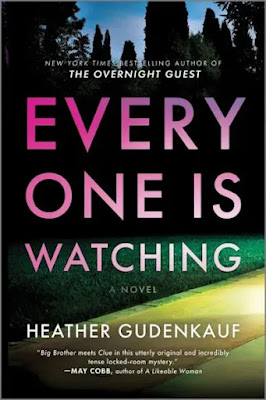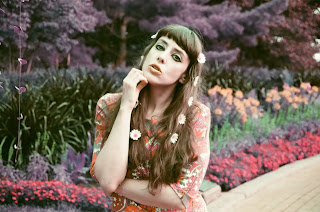Sarah Beth Durst
Sarah Beth Durst is the award-winning author of over twenty books for kids, teens, and adults, including Spark, Drink Slay Love, and The Queens of Renthia series. She won an American Library Association Alex Award and a Mythopoeic  Fantasy Award and has been a finalist for SFWA's Andre Norton Nebula Award three times. She is a graduate of Princeton University and lives in Stony Brook, New York, with her husband, her children, and her ill-mannered cat.
Fantasy Award and has been a finalist for SFWA's Andre Norton Nebula Award three times. She is a graduate of Princeton University and lives in Stony Brook, New York, with her husband, her children, and her ill-mannered cat.
Durst's new novel is The Lies Among Us.
My Q&A with the author:
How much work does your title do to take readers into the story?Visit Sara Beth Durst's website.
The Lies Among Us is quite literally about the lies among us. When Hannah looks at the world, she sees it overlaid with the physical manifestations of the lies we tell one another and ourselves. A toxic sludge spills from the TV while a politician speaks. A shadowy convertible that no one ever owned speeds past her on the highway. The house she grew up in -- when she looks at it, she sees a cheerful two-story yellow house with white shutters, a porch swing, and pink azaleas. Her sister, Leah, sees a drab one-story beige house with peeling paint and a yard full of junk.
Hannah herself cannot be seen or heard by anyone, and in the wake of her mother's death, she struggles to reach out to a sister who will not -- and cannot -- acknowledge her.
It's about sisterhood, grief, and the corrosive nature of lies, as seen through the eyes of a woman who does not exist.
What's in a name?
My favorite source of names is the Social Security website. They have this baby-name statistics page where you can search for names by popularity in their birth year. I use it all time to ensure my character names match their age.
Beyond that, I try to choose names that match the character in feel. Hannah is sheltered, innocent, and kind -- so I gave her a name where the shorter central letters are visually cushioned and protected by the taller first and last letters.
Leah is more bitter, sharper -- I wanted her to have a correspondingly shorter name that also pairs nicely with Hannah, to make them aurally sisters as well as biologically.
How surprised would your teenage reader self be by your new novel?
I think she'd be very surprised. My teenage self would have expected all my books to include swords and monsters and unicorns and winged cats... and in fact, I have written many novels with all those things. (My latest epic fantasy is called The Bone Maker, and it has a bone army and all sorts of wizards and warriors. And my upcoming cozy fantasy, The Spellshop, has both a unicorn and a winged cat, as well as merhorses and a talking spider plant!) But this novel... It's a true departure for me in many ways.
This novel is my first book club fiction and my first family drama, and it was such a tremendous writing experience! In this novel, I had the chance to use the techniques I'd developed in other genres to explore an intangible concept in a concrete way, specifically the concept of lies and the effect they have on our relationships and ourselves. I learned so much by pushing myself to experiment with style, voice, and the interiority of my characters.
Do you find it harder to write beginnings or endings? Which do you change more?
I can't write the book until I know the beginning. It's where I find the voice of the novel. Sometimes it flows out easily, and sometimes I write fifty or moreopenings, auditioning different approaches to the style, the tone, the characters, and the story. The ending usually unfurls naturally from all that I've written in the chapters before.
Do you see much of yourself in your characters? Do they have any connection to your personality, or are they a world apart?
I try to create characters who are distinct from me (and from anyone I know). They need to feel like real, unique people in order for me to write them. That said, I think it's impossible to avoid pouring some of yourself into your characters.
Writing a character a bit like being an actor -- you try to imagine what you would do, say, and feel if you'd had a certain set of experiences and possess a particular worldview, and then you try to bring the character to life (except in writing, your tool is your keyboard, instead of your body, face, and voice).
What non-literary inspirations have influenced your writing?
I always listen to music as I write. For The Lies Among Us, my playlist included a lot of Kate Bush, Tori Amos, k.d. lang, Edie Brickell, Taylor Swift, Vertical Horizon, and multiple covers of Suzanne Vega's "Tom's Diner."
--Marshal Zeringue























